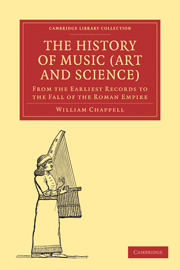Summary
The most convenient basis for a history of ancient music seems to be the early Greek system, for we are here removed from the land of myths, and have the foundation upon which the superstructure of modern art has been raised. The discoveries that have been made in Egypt and in Babylon, within the century that has now passed, since Sir John Hawkins and Dr. Burney wrote their Histories of Music, have revealed an advanced state of the art in most ancient times, which was before unknown and unsuspected. There is no longer room to doubt that the entire Greek system was mainly derived from Egypt, Phoenicia, Babylon, or other countries of more ancient civilization than Greece. The musical instruments of the Greeks may be traced in Egypt, even to the hitherto unobserved Magadis, or Octave playing instrument, of Anacreon, and to the little wailing “span-long” pipe used for lamentations on the death of Adonis. From that pipe must the modern hautboy claim its descent. The total number of notes in the combined Greek scales agrees precisely with the enumeration of the Egyptian system, as revealed to us by Greek writers. The worship of Athena, or Minerva, who corresponds to the Egyptian goddess Neth, was attended by the peculiar custom of having musical instruments to play in Octaves in the temples of both countries. The same system of music must have prevailed in the two, because they had, at least in one case, the same song, and it was a song that, according to Herodotus, was in general use.
- Type
- Chapter
- Information
- The History of Music (Art and Science)From the Earliest Records to the Fall of the Roman Empire, pp. 1 - 22Publisher: Cambridge University PressPrint publication year: 2009First published in: 1874



